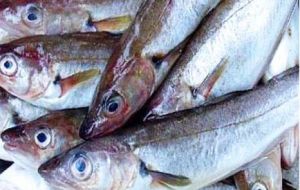MercoPress. South Atlantic News Agency
Falklands' Fortuna Ltd. sponsors research on southern blue whiting
 Wallace from Fortuna Ltd said research would help for the future management and understanding of the dynamics of southern blue whiting in the region.
Wallace from Fortuna Ltd said research would help for the future management and understanding of the dynamics of southern blue whiting in the region.  Dr Brickle said the southern blue whiting had been so abundant that it used to be the controlling and limiting species on all finfish licence types.
Dr Brickle said the southern blue whiting had been so abundant that it used to be the controlling and limiting species on all finfish licence types.  The decline seems to have caused an ecological regime shift for the southern Patagonian Shelf since Patagonia rock cod overtook southern blue whiting
The decline seems to have caused an ecological regime shift for the southern Patagonian Shelf since Patagonia rock cod overtook southern blue whiting Falkland Islands fishing company Fortuna Ltd has become a sponsor and research partner in a PhD student ship on southern blue whiting. The Falkland Islands Government fisheries Department (FIFD) and the South Atlantic Environmental Research Institute (SAERI) are also collaborators in this research project.
SAERI Director Dr Paul Brickle explained that Southern blue whiting was once a very abundant planktivorous fish which inhabits temperate shelf and slope waters off the southern tip of South America.
He said the PhD studentship would be significant to the future management and understanding of the dynamics of southern blue whiting in the fishery in the region.
Stuart Wallace, Managing Director of Fortuna Ltd said Fortuna as a major quota owner had a clear interest in supporting the science which underpins the management of the Falklands Fishery.
“We are extremely pleased to have this opportunity to work with FIG and SAERI on a project that will add to our knowledge of this potentially still commercially
valuable stock.”
Dr Brickle added: “This is a fantastic opportunity for a graduate to embark on a serious career in science and indeed contribute to the management and understanding of the recovery of a once important species in the South Atlantic.”
Southern blue whiting move from their vast feeding grounds in the South Atlantic and sub-Antarctic waters to the south-western part of the Falkland Islands’ shelf to spawn in September–October.
After spawning, the fish spread around the southwest Atlantic to forage and their abundance around the Falklands Islands gradually declines towards austral summer (December /January).
The highest annual commercial catches of about 1.5 million tons for southern blue whiting in the Southwest Atlantic occurred in 1983 followed by peaks and troughs and then a relatively rapid decline from 1990. This decline continued for the remainder of the fishery.
Dr Brickle said the southern blue whiting had been so abundant that it used to be the controlling and limiting species on all finfish licence types.
The decline however is thought to have caused an ecological regime shift in the southern Patagonian Shelf where after the collapse of southern blue whiting stocks in 2004–2007, its role was overtaken by the Patagonian rock cod, which exhibited a 20–30 fold increase in catches and CPUEs.
To mitigate the decline, the FIFD in partnership with the fishing industry reduced the pelagic Total Allowable Catch (TAC) from 18,000 to 6,000 in 2010 and 2,000 tons in 2013.
FIFD also imposed a seasonal closed area on the spawning grounds to the south west of the Falkland Islands during peak spawning periods in 2010, and anecdotally this has resulted in better recruitment in subsequent years.
“This declining trend and lack of regional data highlights the need for a resurrection the Regional Fisheries Management Organisation (RFMO), or at least have some agreement on data sharing and management. The need to tease out the causes of the decline, outside of over exploitation, is important to informing the esource’s management,” said Dr Brickle. (PN).




Top Comments
Disclaimer & comment rules-

-

Read all commentsGreat,
Sep 18th, 2015 - 07:20 pm 0As long as you guys remember, that you wont be allowed to stop-over for a cuppa in argyland.
Hmmm
Sep 25th, 2015 - 10:51 am 0Commenting for this story is now closed.
If you have a Facebook account, become a fan and comment on our Facebook Page!